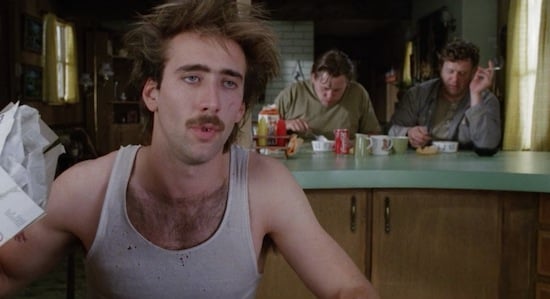Shocking Blocking (33)
By:
August 18, 2012

I appreciate what Nicolas Cage would go on to do in Wild at Heart and Adaptation, but to date his portrayal of Hi McDunnough in the Coen Brothers’ 1987 masterpiece Raising Arizona remains the actor’s only stellar performance. The blank affect that Cage picked up from Matt Dillon — in Francis Ford Coppola’s 1983 teen gang movie Rumble Fish, in which Cage and Dillon share a fraught moment — was so post-punk! (And so timely: Everyone has a blank affect in the 1984 teen gang punksploitation flick Suburbia; the same is true of Paul Morrissey’s 1985 teen gang movie Mixed Blood.) As those of us who were in our teens and twenties during the Eighties recall, a blank affect could be a canny psychic-survival stratagem. But we’d have to grow up eventually; what then? The blocking in this scene suggests that Hi is torn between two unacceptable options. He could allow his blankness to harden into the hip sociopathy of the man-children Gale and Evelle (John Goodman and William Forsythe); or he could become the sentimental, deluded grownup that his wife Ed (Holly Hunter) expects him to. In an anomic Seventies movie, Hi might choose the former; in a Nineties shamesploitation movie, the latter. But like Melville’s blank, canny antihero Bartleby, when it comes to making a sucker’s choice, Hi prefers not to.
An occasional series analyzing some of the author’s favorite moments in the positioning or movement of actors in a movie.
THIRTIES (1934–1943): It Happened One Night (1934) | The Man Who Knew Too Much (1934) | The Guv’nor (1935) | The 39 Steps (1935) | Young and Innocent (1937) | The Lady Vanishes (1938) | Mr. Smith Goes to Washington (1939) | The Big Sleep (1939) | The Little Princess (1939) | Gone With the Wind (1939) | His Girl Friday (1940)
FORTIES (1944–1953): The Diary of a Chambermaid (1946) | The Asphalt Jungle (1950) | The African Queen (1951)
FIFTIES (1954–1963): A Bucket of Blood (1959) | Beach Party (1963)
SIXTIES (1964–1973): For Those Who Think Young (1964) | Thunderball (1965) | Clambake (1967) | Bonnie and Clyde (1967) | Madigan (1968) | Wild in the Streets (1968) | Barbarella (1968) | Harold and Maude (1971) | The Mack (1973) | The Long Goodbye (1973)
SEVENTIES (1974–1983): Les Valseuses (1974) | Eraserhead (1976) | The Bad News Bears (1976) | Breaking Away (1979) | Rock’n’Roll High School (1979) | Escape from Alcatraz (1979) | Apocalypse Now (1979) | Caddyshack (1980) | Stripes (1981) | Blade Runner (1982) | Tender Mercies (1983) | Monty Python’s The Meaning of Life (1983)
EIGHTIES (1984–1993): Repo Man (1984) | Buckaroo Banzai (1984) | Raising Arizona (1987) | RoboCop (1987) | Goodfellas (1990) | Candyman (1992) | Dazed and Confused (1993) |
NINETIES (1994–2003): Pulp Fiction (1994) | The Fifth Element (1997)
OUGHTS (2004–13): Nacho Libre (2006) | District 9 (2009)
Joshua Glenn’s books include UNBORED: THE ESSENTIAL FIELD GUIDE TO SERIOUS FUN (with Elizabeth Foy Larsen); and SIGNIFICANT OBJECTS: 100 EXTRAORDINARY STORIES ABOUT ORDINARY THINGS (with Rob Walker).
